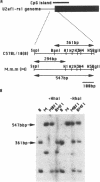Abstract
The mouse U2af1-rs1(SP2) gene, which was cloned by a two-dimensional genome scanning method, is expressed exclusively from the paternally inherited chromosome. This gene has significant similarity to U2AF and located in chromosome 11, of which maternal duplication/paternal deficiency results in a small body. In this report, we cloned genomic U2af1-rs1(SP2) and found its promoter was methylated in a maternal-allele-specific manner. This allelic methylation was not established in parental gametes, but established between 1.5 d.p.c. and 12.5 d.p.c. on the contrary, the allele-specific expression occurred in the two-cell stage when transcription initiates. Absence of the methylation of the upstream region in this stage indicates that methylation is not necessary for inactivation of the expression.
Full text
PDF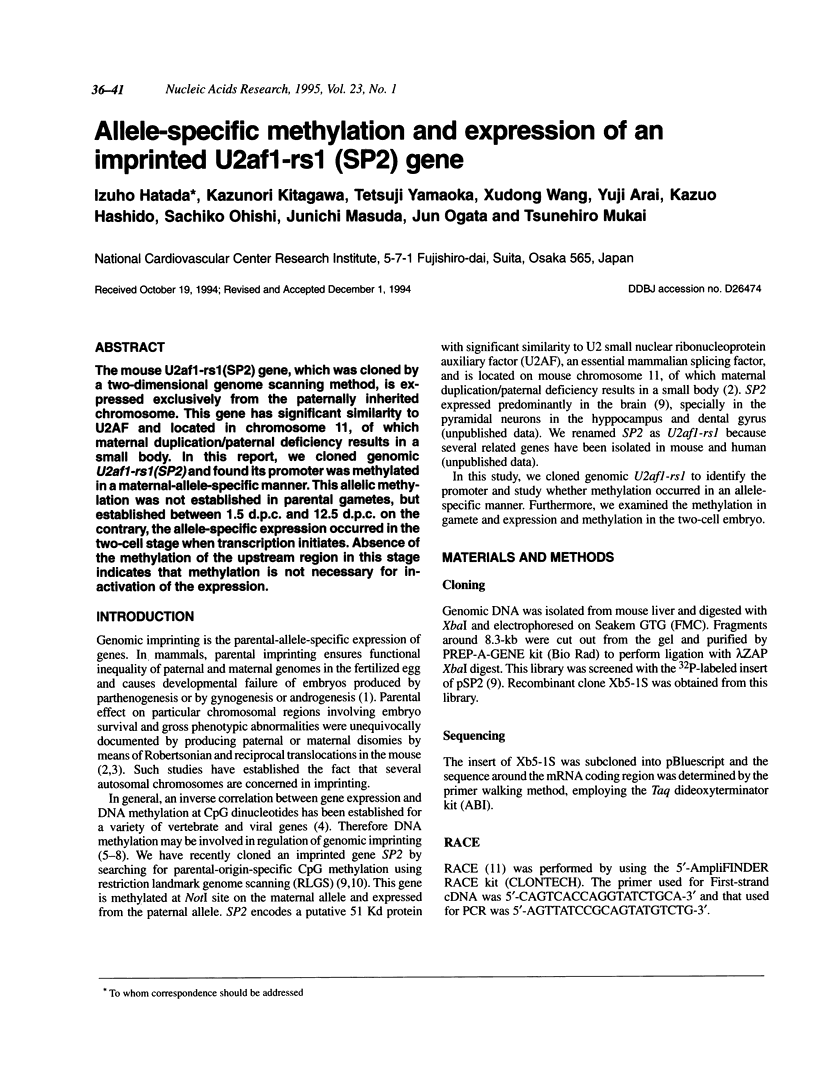
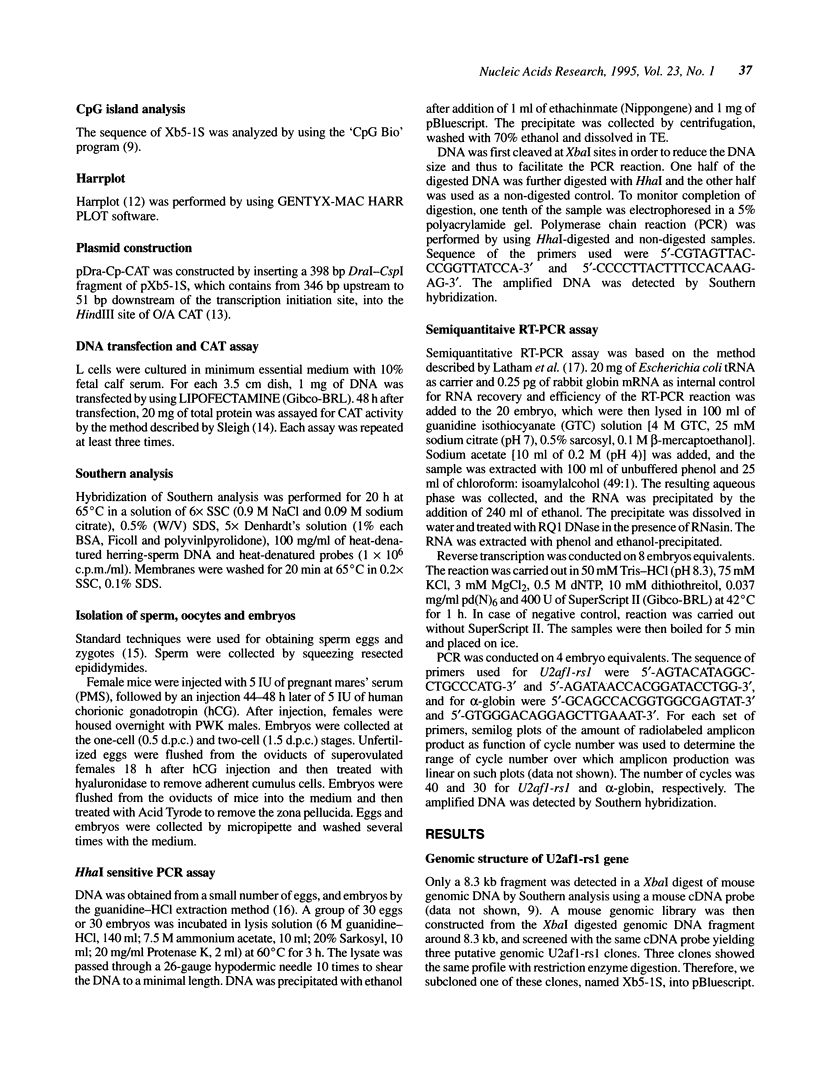
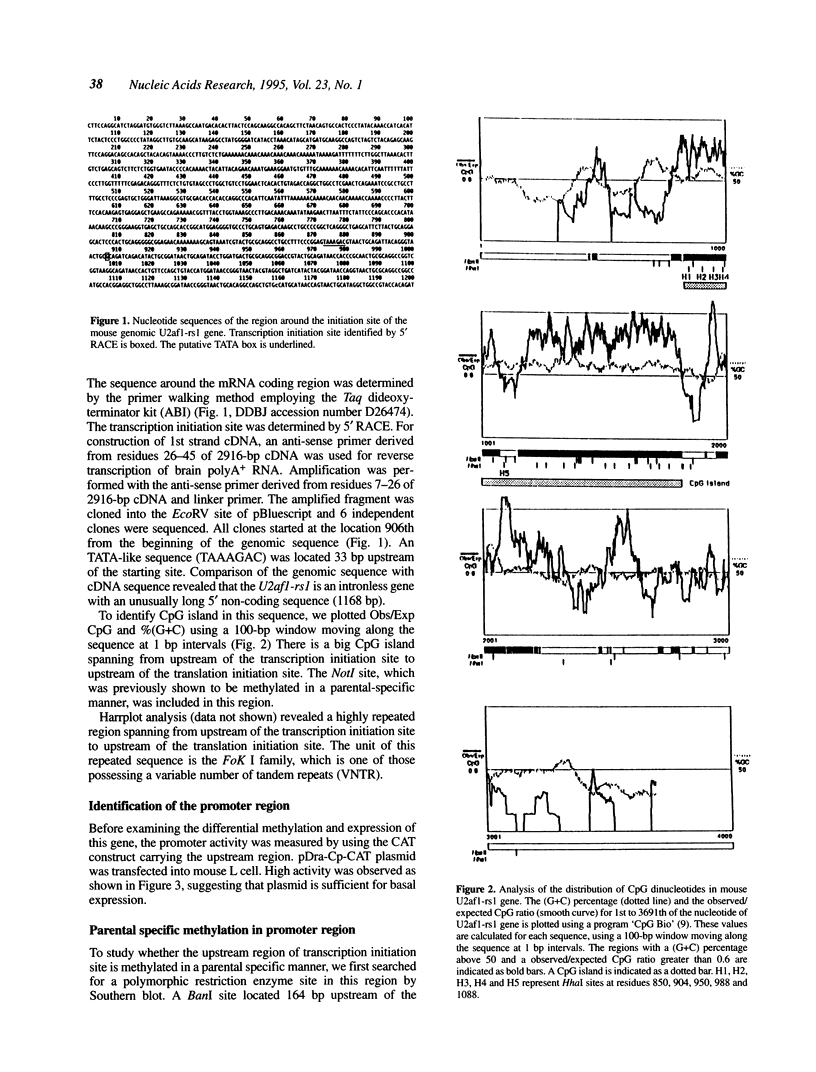
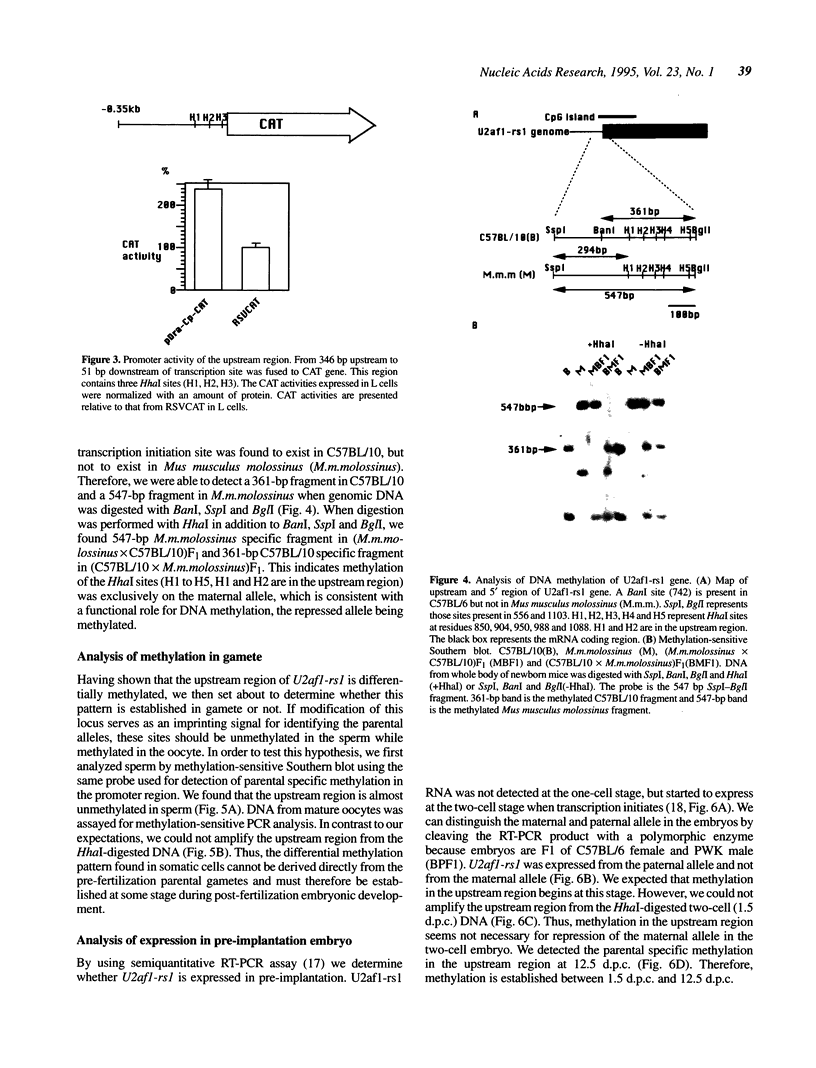
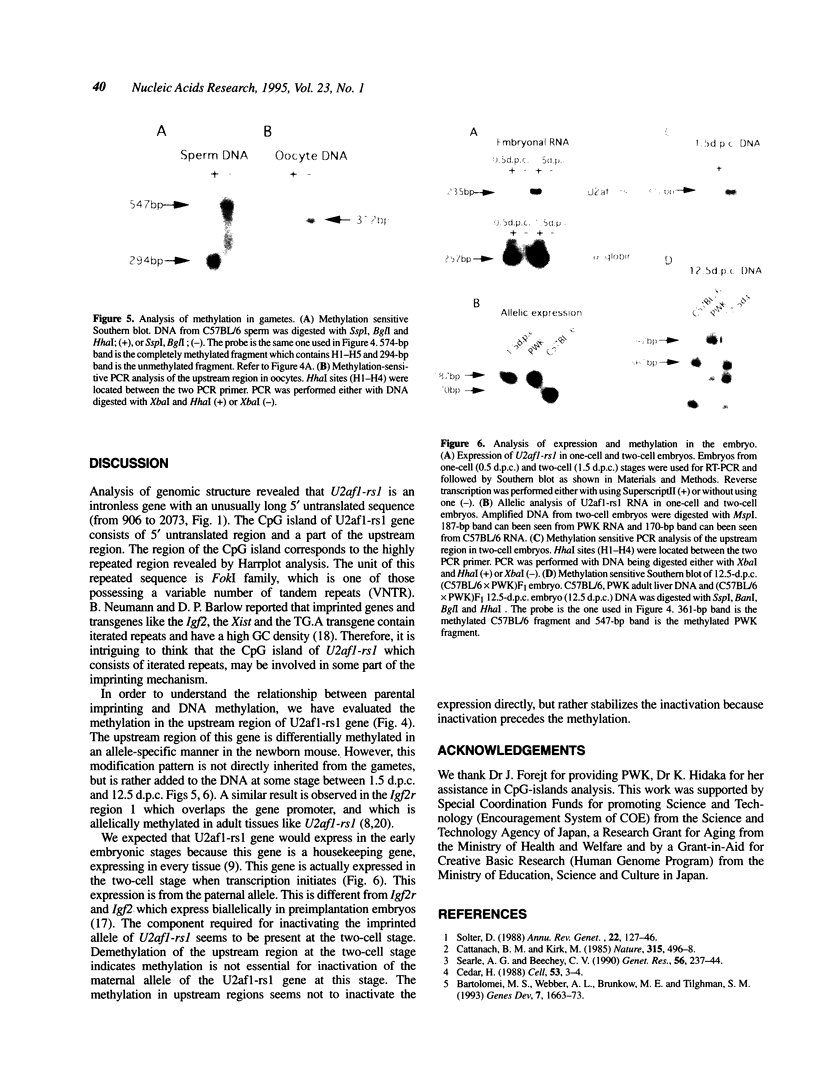

Images in this article
Selected References
These references are in PubMed. This may not be the complete list of references from this article.
- Barlow D. P., Stöger R., Herrmann B. G., Saito K., Schweifer N. The mouse insulin-like growth factor type-2 receptor is imprinted and closely linked to the Tme locus. Nature. 1991 Jan 3;349(6304):84–87. doi: 10.1038/349084a0. [DOI] [PubMed] [Google Scholar]
- Bartolomei M. S., Webber A. L., Brunkow M. E., Tilghman S. M. Epigenetic mechanisms underlying the imprinting of the mouse H19 gene. Genes Dev. 1993 Sep;7(9):1663–1673. doi: 10.1101/gad.7.9.1663. [DOI] [PubMed] [Google Scholar]
- Brandeis M., Kafri T., Ariel M., Chaillet J. R., McCarrey J., Razin A., Cedar H. The ontogeny of allele-specific methylation associated with imprinted genes in the mouse. EMBO J. 1993 Sep;12(9):3669–3677. doi: 10.1002/j.1460-2075.1993.tb06041.x. [DOI] [PMC free article] [PubMed] [Google Scholar]
- Cattanach B. M., Kirk M. Differential activity of maternally and paternally derived chromosome regions in mice. Nature. 1985 Jun 6;315(6019):496–498. doi: 10.1038/315496a0. [DOI] [PubMed] [Google Scholar]
- Cedar H. DNA methylation and gene activity. Cell. 1988 Apr 8;53(1):3–4. doi: 10.1016/0092-8674(88)90479-5. [DOI] [PubMed] [Google Scholar]
- Ferguson-Smith A. C., Sasaki H., Cattanach B. M., Surani M. A. Parental-origin-specific epigenetic modification of the mouse H19 gene. Nature. 1993 Apr 22;362(6422):751–755. doi: 10.1038/362751a0. [DOI] [PubMed] [Google Scholar]
- Flach G., Johnson M. H., Braude P. R., Taylor R. A., Bolton V. N. The transition from maternal to embryonic control in the 2-cell mouse embryo. EMBO J. 1982;1(6):681–686. doi: 10.1002/j.1460-2075.1982.tb01230.x. [DOI] [PMC free article] [PubMed] [Google Scholar]
- Frohman M. A., Dush M. K., Martin G. R. Rapid production of full-length cDNAs from rare transcripts: amplification using a single gene-specific oligonucleotide primer. Proc Natl Acad Sci U S A. 1988 Dec;85(23):8998–9002. doi: 10.1073/pnas.85.23.8998. [DOI] [PMC free article] [PubMed] [Google Scholar]
- Harr R., Hagblom P., Gustafsson P. Two-dimensional graphic analysis of DNA sequence homologies. Nucleic Acids Res. 1982 Jan 11;10(1):365–374. doi: 10.1093/nar/10.1.365. [DOI] [PMC free article] [PubMed] [Google Scholar]
- Hatada I., Hayashizaki Y., Hirotsune S., Komatsubara H., Mukai T. A genomic scanning method for higher organisms using restriction sites as landmarks. Proc Natl Acad Sci U S A. 1991 Nov 1;88(21):9523–9527. doi: 10.1073/pnas.88.21.9523. [DOI] [PMC free article] [PubMed] [Google Scholar]
- Hatada I., Sugama T., Mukai T. A new imprinted gene cloned by a methylation-sensitive genome scanning method. Nucleic Acids Res. 1993 Dec 11;21(24):5577–5582. doi: 10.1093/nar/21.24.5577. [DOI] [PMC free article] [PubMed] [Google Scholar]
- Jeanpierre M. A rapid method for the purification of DNA from blood. Nucleic Acids Res. 1987 Nov 25;15(22):9611–9611. doi: 10.1093/nar/15.22.9611. [DOI] [PMC free article] [PubMed] [Google Scholar]
- Joh K., Takano K., Mukai T., Hori K. Analysis of upstream regulatory regions required for the activities of two promoters of the rat aldolase A gene. FEBS Lett. 1991 Nov 4;292(1-2):128–132. doi: 10.1016/0014-5793(91)80849-x. [DOI] [PubMed] [Google Scholar]
- Latham K. E., Doherty A. S., Scott C. D., Schultz R. M. Igf2r and Igf2 gene expression in androgenetic, gynogenetic, and parthenogenetic preimplantation mouse embryos: absence of regulation by genomic imprinting. Genes Dev. 1994 Feb 1;8(3):290–299. doi: 10.1101/gad.8.3.290. [DOI] [PubMed] [Google Scholar]
- Searle A. G., Beechey C. V. Genome imprinting phenomena on mouse chromosome 7. Genet Res. 1990 Oct-Dec;56(2-3):237–244. doi: 10.1017/s0016672300035333. [DOI] [PubMed] [Google Scholar]
- Sleigh M. J. A nonchromatographic assay for expression of the chloramphenicol acetyltransferase gene in eucaryotic cells. Anal Biochem. 1986 Jul;156(1):251–256. doi: 10.1016/0003-2697(86)90180-6. [DOI] [PubMed] [Google Scholar]
- Solter D. Differential imprinting and expression of maternal and paternal genomes. Annu Rev Genet. 1988;22:127–146. doi: 10.1146/annurev.ge.22.120188.001015. [DOI] [PubMed] [Google Scholar]
- Stöger R., Kubicka P., Liu C. G., Kafri T., Razin A., Cedar H., Barlow D. P. Maternal-specific methylation of the imprinted mouse Igf2r locus identifies the expressed locus as carrying the imprinting signal. Cell. 1993 Apr 9;73(1):61–71. doi: 10.1016/0092-8674(93)90160-r. [DOI] [PubMed] [Google Scholar]



